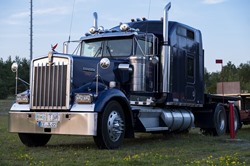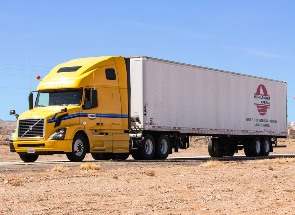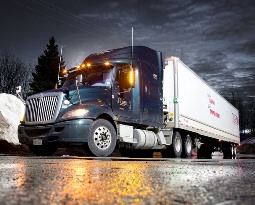How to Enroll in the Right CDL Driving School near Bow New Hampshire
 Congratulations on your decision to become a truck driver and enroll in a CDL school near Bow NH. Maybe it has always been your fantasy to hit the open highway while operating a monster tractor trailer. Or maybe you have conducted some analysis and have discovered that an occupation as a truck driver offers excellent pay and flexible job prospects. Regardless of what your reason is, it’s essential to obtain the appropriate training by choosing the right CDL school in your area. When evaluating your options, there are various variables that you’ll want to examine before making your ultimate choice. Location will certainly be an issue, especially if you need to commute from your Bow residence. The cost will also be important, but selecting a school based solely on price is not the optimal way to make sure you’ll receive the right education. Don’t forget, your goal is to master the knowledge and skills that will allow you to pass the CDL examinations and become a qualified truck driver. So keeping that purpose in mind, just how do you choose a truck driving school? That is what we are going to cover in the rest of this article. But first, we are going to talk a little bit about which commercial driver’s license you will eventually need.
Congratulations on your decision to become a truck driver and enroll in a CDL school near Bow NH. Maybe it has always been your fantasy to hit the open highway while operating a monster tractor trailer. Or maybe you have conducted some analysis and have discovered that an occupation as a truck driver offers excellent pay and flexible job prospects. Regardless of what your reason is, it’s essential to obtain the appropriate training by choosing the right CDL school in your area. When evaluating your options, there are various variables that you’ll want to examine before making your ultimate choice. Location will certainly be an issue, especially if you need to commute from your Bow residence. The cost will also be important, but selecting a school based solely on price is not the optimal way to make sure you’ll receive the right education. Don’t forget, your goal is to master the knowledge and skills that will allow you to pass the CDL examinations and become a qualified truck driver. So keeping that purpose in mind, just how do you choose a truck driving school? That is what we are going to cover in the rest of this article. But first, we are going to talk a little bit about which commercial driver’s license you will eventually need.
Which Commercial Drivers License Will You Need?
 To operate commercial vehicles lawfully within the United States and Bow NH, an operator must get a CDL (Commercial Driver’s License). The three classes of licenses that a person can apply for are Class A, Class B and Class C. Since the topic of this article is how to pick a truck driver school, we will discuss Class A and Class B licenses. What differentiates each class of CDL is the type of vehicle that the driver can operate together with the GVWR (Gross Vehicle Weight Rating) or GCWR (Gross Combination Weight Rating). Below are brief summaries for the two classes.
To operate commercial vehicles lawfully within the United States and Bow NH, an operator must get a CDL (Commercial Driver’s License). The three classes of licenses that a person can apply for are Class A, Class B and Class C. Since the topic of this article is how to pick a truck driver school, we will discuss Class A and Class B licenses. What differentiates each class of CDL is the type of vehicle that the driver can operate together with the GVWR (Gross Vehicle Weight Rating) or GCWR (Gross Combination Weight Rating). Below are brief summaries for the two classes.
Class A CDL. A Class A Commercial Drivers License is needed to operate any vehicle that has a GCWR of more than 26,000 lbs., including a towed vehicle of more than 10,000 lbs. A few of the vehicles that operators may be able to drive with Class A licenses are:
- Interstate or Intrastate Tractor Trailers
- Trucks with Double or Triple Trailers
- Tanker Trucks
- Livestock Carriers
- Class B and Class C Vehicles
Class B CDL. A Class B CDL is needed to drive single vehicles having a GVWR of greater than 26,000 lbs., or a GCWR of greater than 26,000 lbs. including a towed vehicle weighing up to 10,000 lbs. Several of the vehicles that drivers may be qualified to operate with Class B licenses are:
- Tractor Trailers
- Dump Trucks
- Cement Mixers
- Large Buses
- Class C Vehicles
Both Class A and Class B CDLs may also need endorsements to drive specific kinds of vehicles, including school or passenger buses. And a Class A license holder, with the proper needed endorsements, can operate any vehicle that a Class B licensee is authorized to drive.
Click Here to Get Free Information on Truck Driving Schools Near You!
How to Research a Trucking School
 Once you have determined which Commercial Drivers License you would like to obtain, you can start the undertaking of evaluating the Bow NH truck driver schools that you are looking at. As previously mentioned, cost and location will undoubtedly be your primary concerns. But it can’t be stressed enough that they must not be your sole considerations. Other variables, for instance the reputations of the schools or the experience of the instructors are equally if not more important. So below are a few additional points that you need to research while carrying out your due diligence prior to selecting, and especially paying for, your truck driving training.
Once you have determined which Commercial Drivers License you would like to obtain, you can start the undertaking of evaluating the Bow NH truck driver schools that you are looking at. As previously mentioned, cost and location will undoubtedly be your primary concerns. But it can’t be stressed enough that they must not be your sole considerations. Other variables, for instance the reputations of the schools or the experience of the instructors are equally if not more important. So below are a few additional points that you need to research while carrying out your due diligence prior to selecting, and especially paying for, your truck driving training.
Are the Schools Accredited or Certified ? Very few truck driving schools in the Bow NH area are accredited because of the stringent process and cost to the schools. On the other hand, certification is more commonplace and is provided by the Professional Truck Driver Institute (PTDI). A school is not required to become certified, but there are several advantages. Potential students know that the training will be of the highest caliber, and that they will be given lots of driving time. As an example, PTDI requires 44 hours of actual driving time, not ride-alongs or simulations. So if a school’s program is certified (the program, not the school is certified), students know that the training and curriculum will meet the very high benchmarks set by PTDI.
How Long in Operation? One indicator to help measure the quality of a truck driving school is how long it has been in operation. A poorly rated or a fly by night school normally will not be in business very long, so longevity is a plus. However, even the top Bow NH schools had to start from their opening day of training, so consider it as one of several qualifiers. You can also ask what the school’s track record is concerning successful licensing and job placement of its graduates. If a school won’t supply those stats, search elsewhere. The schools should also maintain associations with local and national trucking companies. Having numerous contacts not only confirms a quality reputation within the industry, but also boosts their job assistance program for students. It also wouldn’t hurt to check with the New Hampshire licensing authority to make sure that the CDL trucker schools you are researching are in compliance.
How Effective is the Training? At a minimum, the schools must be licensed in New Hampshire and employ teachers that are trained and experienced. We will talk more about the instructors in the following section. Also, the student to instructor ratio should not be higher than 4 to 1. If it’s any greater, then students will not be obtaining the individual instruction they will need. This is particularly true regarding the one-on-one instruction for behind the wheel training. And watch out for any school that professes it can train you to drive trucks in a relatively short time period. Training to be an operator and to drive a tractor trailer professionally requires time. Most Bow NH schools offer training courses that run from 3 weeks to as long as two months, based on the class of license or type of vehicle.
How Good are the Teachers? As previously stated, it’s essential that the teachers are trained to teach driving methods and experienced as both instructors and drivers. Even though a number of states have minimum driving time criteria to qualify as a teacher, the more successful driving experience a teacher has the better. It’s also important that the teachers stay up to date with industry developments or any new regulations or changes in existing laws. Assessing instructors may be a little more intuitive than other standards, and perhaps the ideal approach is to check out the school and talk to the instructors face to face. You can also talk to a few of the students going through the training and ask if they are happy with the level of instruction and the teacher’s qualification to train them.
Sufficient Driving Time? Most importantly, an excellent truck driver school will furnish ample driving time to its students. Besides, isn’t that what it’s all about? Driving time is the real time spent behind the wheel operating a truck. Even though the use of simulators and ride-a-longs with other students are important training methods, they are no replacement for real driving. The more training that a student gets behind the wheel, the better driver he or she will be. Although driving time fluctuates between schools, a good benchmark is 32 hours at a minimum. If the school is PTDI certified, it will furnish at least 44 hours of driving time. Get in touch with the Bow NH schools you are researching and ask how much driving time they provide.
Are they Independent or Captive ? You can obtain discounted or even free training from certain trucking schools if you make a commitment to drive for a particular carrier for a defined time period. This is what’s known as contract training, and the schools that provide it are called captives. So rather than having affiliations with numerous trucking lines that they can refer their students to, captives only work with one company. The benefit is receiving less expensive or even free training by giving up the flexibility to initially work wherever you choose. Naturally contract training has the potential to restrict your income prospects when starting out. But for many it may be the only way to get affordable training. Just make sure to find out if the Bow NH schools you are considering are independent or captive so that you can make an informed decision.
Offer Onsite CDL Testing? There are a number of states that will allow 3rd party CDL testing onsite of truck driver schools for its graduates. If onsite testing is available in New Hampshire, ask if the schools you are looking at are DMV certified to provide it. One advantage is that it is more convenient than battling with graduates of competing schools for test times at New Hampshire testing locations. It is moreover an indication that the DMV considers the approved schools to be of a higher quality.
Are the Classes Accessible? As formerly mentioned, CDL training is just one to two months long. With such a brief term, it’s important that the Bow NH school you choose offers flexibility for both the scheduling of classes and the curriculum. As an example, if you’re having a hard time learning a particular driving maneuver, then the teacher should be prepared to commit more time with you until you have it mastered. And if you’re still holding a job while going to training, then the class scheduling needs to be flexible enough to accommodate working hours or other commitments.
Is Job Placement Provided? Once you have received your CDL license after graduating from trucking school, you will be eager to begin your new profession. Make sure that the schools you are looking at have job placement programs. Ask what their job placement ratio is and what average salary their graduates start at. Also, ask which national and local trucking firms their graduates are referred to for hiring. If a school has a low job placement rate or few Bow NH employers recruiting their graduates, it may be a clue to look elsewhere.
Is Financial Assistance Available? Truck driver schools are similar to colleges and other Bow NH area trade or technical schools when it comes to loans and other forms of financial aid being available. Find out if the schools you are examining have a financial assistance department, or at least someone who can help you get through the options and forms that need to be completed.
School For CDL License Bow New Hampshire
 Selecting the right trucking school is a critical first step to launching your new vocation as a long distance or local truck driver. The skill sets taught at school will be those that forge a new career behind the wheel. There are several options offered and understanding them is critical to a new driver’s success. You originally came to our website because of your interest in School For CDL License and wanting information on the topic Truck Driver Training Schools. However, you must obtain the necessary training in order to operate a big commercial vehicle in a professional and safe manner. If you are short on cash or financing, you might want to look into a captive school. You will pay a lower or in some cases no tuition in exchange for driving for their contracted carrier. Or you can choose an independent CDL school and have the the freedom to drive for the trucking company of your choice, or one of several associated with the school. It’s your decision. But no matter how you get your training, you will in the near future be part of an industry that helps our country move as a professional trucker in Bow NH.
Selecting the right trucking school is a critical first step to launching your new vocation as a long distance or local truck driver. The skill sets taught at school will be those that forge a new career behind the wheel. There are several options offered and understanding them is critical to a new driver’s success. You originally came to our website because of your interest in School For CDL License and wanting information on the topic Truck Driver Training Schools. However, you must obtain the necessary training in order to operate a big commercial vehicle in a professional and safe manner. If you are short on cash or financing, you might want to look into a captive school. You will pay a lower or in some cases no tuition in exchange for driving for their contracted carrier. Or you can choose an independent CDL school and have the the freedom to drive for the trucking company of your choice, or one of several associated with the school. It’s your decision. But no matter how you get your training, you will in the near future be part of an industry that helps our country move as a professional trucker in Bow NH.
Truck On in These Other New Hampshire Locations
Bow, New Hampshire
The town was granted by the authorities of New Hampshire, to Jonathan Wiggin and others, in 1727, and was originally 9 miles (14 km) square, and covered nearly all the territory granted to Ebenezer Eastman and others, by the authorities of Massachusetts, two years previous, under the name of Pennacook (now Concord). Massachusetts claimed to hold authority over a large portion of the territory of New Hampshire for many years, till the final boundary line was established, in 1741, giving New Hampshire more territory than it had ever claimed. These complicated lines of the two towns coming from two different authorities, were not settled decisively till after the final separation of the two colonial provinces. The government of New Hampshire gave Bow the preference in its grant of 1727, and did not recognize the title of the Pennacook grantees, and in the bill giving a charter for the parish of Concord, it was worded as "taking a part of the town of Bow," etc. Although Concord was granted and surveyed before Bow, its final organization was 38 years after it. Bow gained a victory over Concord in its original title; still it was obliged to yield over two-thirds of its territory to Concord, Pembroke and Hopkinton, establishing their final boundary lines at different times, from 1759 to 1765.[2]
According to the United States Census Bureau, the town has a total area of 28.4 square miles (73.6 km2), of which 28.0 sq mi (72.6 km2) is land and 0.39 sq mi (1.0 km2) is water, comprising 1.38% of the town.[1] The highest point in Bow is Picked Hill, at 915 feet (279 m) above sea level, in the southern part of town. Nearby Wood Hill and Brown Hill also top 900 feet (270 m). Bow lies fully within the Merrimack River watershed.[4]
As of the census[7] of 2000, there were 7,138 people, 2,304 households, and 2,045 families residing in the town. The population density was 254.3 people per square mile (98.2/km²). There were 2,330 housing units at an average density of 83.0 per square mile (32.0/km²). The racial makeup of the town was 97.79% White, 0.13% African American, 0.10% Native American, 1.04% Asian, 0.29% from other races, and 0.66% from two or more races. Hispanic or Latino of any race were 0.49% of the population.
Business Results 1 - 10 of 14





